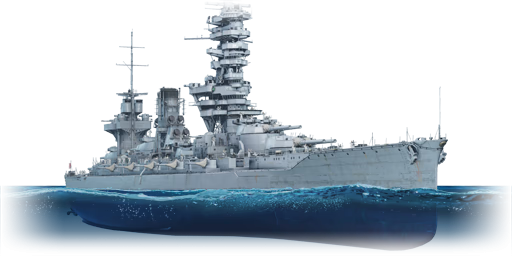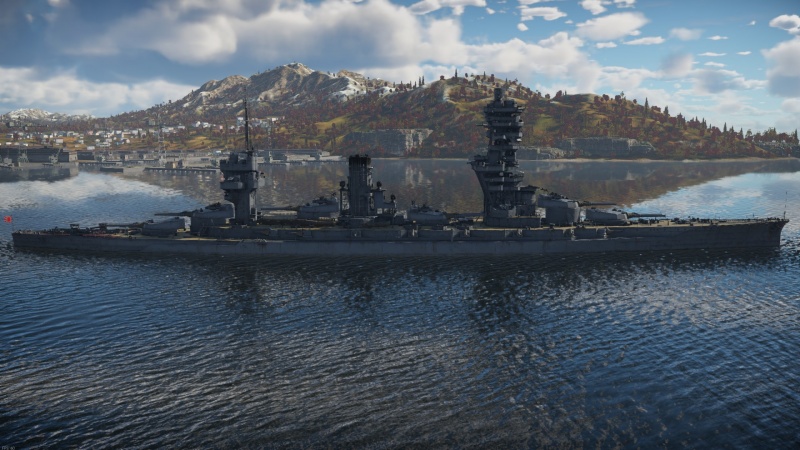Difference between revisions of "IJN Fuso"
(→Armament) |
(→Secondary armament) |
||
| Line 41: | Line 41: | ||
<!-- ''Some ships are fitted with weapons of various calibres. Secondary armaments are defined as weapons chosen with the control <code>Select secondary weapon</code>. Evaluate the secondary armaments and give advice on how to use them. Describe the ammunition available for the secondary armament. Provide recommendations on how to use them and which ammunition to choose. Remember that any anti-air armament, even heavy calibre weapons, belong in the next section. If there is no secondary armament, remove this section.'' --> | <!-- ''Some ships are fitted with weapons of various calibres. Secondary armaments are defined as weapons chosen with the control <code>Select secondary weapon</code>. Evaluate the secondary armaments and give advice on how to use them. Describe the ammunition available for the secondary armament. Provide recommendations on how to use them and which ammunition to choose. Remember that any anti-air armament, even heavy calibre weapons, belong in the next section. If there is no secondary armament, remove this section.'' --> | ||
{{main|15 cm/50 Type 41 (152 mm)|5 inch/40 Type 89 (127 mm)}} | {{main|15 cm/50 Type 41 (152 mm)|5 inch/40 Type 89 (127 mm)}} | ||
| − | |||
| − | |||
{{:15 cm/50 Type 41 (152 mm)/Ammunition|152 mm Type 0 HE, 152 mm Type 4 SAP}} | {{:15 cm/50 Type 41 (152 mm)/Ammunition|152 mm Type 0 HE, 152 mm Type 4 SAP}} | ||
| + | {{:5 inch/40 Type 89 (127 mm)/Ammunition|127 mm HE, 127 mm HE-TF}} | ||
=== Anti-aircraft armament === | === Anti-aircraft armament === | ||
Revision as of 22:14, 14 February 2023
Contents
Description
The Fuso-class, IJN Fuso, 1944 (扶桑, namesake: classical name for Japan) is a rank VI Japanese battleship with a battle rating of 7.0 (AB/RB/SB). It was introduced in Update "Fire and Ice".
Commissioned in 1915, Fusō played no role during WWI. She was modernized in 1930–1935 and again in 1937–1941, with improvements to her armor and propulsion machinery and her iconic rebuilt superstructure in the pagoda mast style. She appears in War Thunder in her 1944 modernization, offering plenty of onboard anti-air which will shred any plane at medium-close range due to the sheer amount of guns (8 x 127 mm; 89 x 25 mm; 10 x 13.2 mm).
General info
Survivability and armour
Talk about the vehicle's armour. Note the most well-defended and most vulnerable zones, e.g. the ammo magazine. Evaluate the composition of components and assemblies responsible for movement and manoeuvrability. Evaluate the survivability of the primary and secondary armaments separately. Don't forget to mention the size of the crew, which plays an important role in fleet mechanics. Save tips on preserving survivability for the "Usage in battles" section. If necessary, use a graphical template to show the most well-protected or most vulnerable points in the armour.
Mobility
Write about the ship's mobility. Evaluate its power and manoeuvrability, rudder rerouting speed, stopping speed at full tilt, with its maximum forward and reverse speed.
| Mobility Characteristics | |||
|---|---|---|---|
| Game Mode | Upgrade Status | Maximum Speed (km/h) | |
| Forward | Reverse | ||
| AB | |||
| Upgraded | 53 | 25 | |
| RB/SB | |||
| Upgraded | 46 | 22 | |
Modifications and economy
Armament
Primary armament
Provide information about the characteristics of the primary armament. Evaluate their efficacy in battle based on their reload speed, ballistics and the capacity of their shells. Add a link to the main article about the weapon: {{main|Weapon name (calibre)}}. Broadly describe the ammunition available for the primary armament, and provide recommendations on how to use it and which ammunition to choose.
| Penetration statistics | |||||||
|---|---|---|---|---|---|---|---|
| Ammunition | Type of warhead |
Penetration @ 0° Angle of Attack (mm) | |||||
| 1,000 m | 2,500 m | 5,000 m | 7,500 m | 10,000 m | 15,000 m | ||
| Ordinary SAP | SAPCBC | 301 | 280 | 248 | 222 | 199 | 168 |
| Type 91 APC | APCBC | 635 | 593 | 529 | 476 | 431 | 366 |
| Common Type 0 | HE | 67 | 67 | 67 | 67 | 67 | 67 |
| Shell details | ||||||||||||
|---|---|---|---|---|---|---|---|---|---|---|---|---|
| Ammunition | Type of warhead |
Velocity (m/s) |
Projectile mass (kg) |
Fuse delay (s) |
Fuse sensitivity (mm) |
Explosive mass (TNT equivalent) (kg) |
Ricochet | |||||
| 0% | 50% | 100% | ||||||||||
| Ordinary SAP | SAPCBC | 780 | 635.58 | 0.01 | 26 | 68.64 | 48° | 63° | 71° | |||
| Type 91 APC | APCBC | 771 | 671.3 | 0.05 | 26 | 11.66 | 48° | 63° | 71° | |||
| Common Type 0 | HE | 805 | 621 | 0 | 0.1 | 31 | 79° | 80° | 81° | |||
Secondary armament
| Penetration statistics | |||||||
|---|---|---|---|---|---|---|---|
| Ammunition | Type of warhead |
Penetration @ 0° Angle of Attack (mm) | |||||
| 1,000 m | 2,500 m | 5,000 m | 7,500 m | 10,000 m | 15,000 m | ||
| Type 0 HE | HE | 35 | 35 | 35 | 35 | 35 | 35 |
| Type 4 SAP | SAP | 81 | 68 | 52 | 40 | 34 | 34 |
| Shell details | ||||||||||||
|---|---|---|---|---|---|---|---|---|---|---|---|---|
| Ammunition | Type of warhead |
Velocity (m/s) |
Projectile mass (kg) |
Fuse delay (s) |
Fuse sensitivity (mm) |
Explosive mass (TNT equivalent) (kg) |
Ricochet | |||||
| 0% | 50% | 100% | ||||||||||
| Type 0 HE | HE | 850 | 45.26 | 0 | 0.1 | 3.17 | 79° | 80° | 81° | |||
| Type 4 SAP | SAP | 850 | 45.26 | 0.01 | 7 | 2.92 | 47° | 60° | 65° | |||
| Penetration statistics | |||||||
|---|---|---|---|---|---|---|---|
| Ammunition | Type of warhead |
Penetration @ 0° Angle of Attack (mm) | |||||
| 1,000 m | 2,500 m | 5,000 m | 7,500 m | 10,000 m | 15,000 m | ||
| 127 mm HE | HE | 25 | 25 | 25 | 25 | 25 | 25 |
| 127 mm HE-TF | HE-TF | 25 | 25 | 25 | 25 | 25 | 25 |
| Shell details | ||||||||||||
|---|---|---|---|---|---|---|---|---|---|---|---|---|
| Ammunition | Type of warhead |
Velocity (m/s) |
Projectile mass (kg) |
Fuse delay (m) |
Fuse sensitivity (mm) |
Explosive mass (TNT equivalent) (kg) |
Ricochet | |||||
| 0% | 50% | 100% | ||||||||||
| 127 mm HE | HE | 720 | 23 | 0 | 0.1 | 1.96 | 79° | 80° | 81° | |||
| 127 mm HE-TF | HE-TF | 720 | 23 | 0 | 0.1 | 1.96 | 79° | 80° | 81° | |||
Anti-aircraft armament
An important part of the ship's armament responsible for air defence. Anti-aircraft armament is defined by the weapon chosen with the control Select anti-aircraft weapons. Talk about the ship's anti-air cannons and machine guns, the number of guns and their positions, their effective range, and about their overall effectiveness – including against surface targets. If there are no anti-aircraft armaments, remove this section.
Usage in battles
Describe the technique of using this ship, the characteristics of her use in a team and tips on strategy. Abstain from writing an entire guide – don't try to provide a single point of view, but give the reader food for thought. Talk about the most dangerous opponents for this vehicle and provide recommendations on fighting them. If necessary, note the specifics of playing with this vehicle in various modes (AB, RB, SB).
Pros and cons
Pros:
- Effective guns
- Effective anti-air suite
- Adequate armour that can absorb damage
- Large crew complement
Cons:
- Long reload time on main batteries
- Slow cruise speed
- Extremely long turn time
History
Describe the history of the creation and combat usage of the ship in more detail than in the introduction. If the historical reference turns out to be too long, take it to a separate article, taking a link to the article about the ship and adding a block "/History" (example: https://wiki.warthunder.com/(Ship-name)/History) and add a link to it here using the main template. Be sure to reference text and sources by using <ref></ref>, as well as adding them at the end of the article with <references />. This section may also include the ship's dev blog entry (if applicable) and the in-game encyclopedia description (under === In-game description ===, also if applicable).
Media
- Skins
See also
Links to articles on the War Thunder Wiki that you think will be useful for the reader, for example:
- reference to the series of the ship;
- links to approximate analogues of other nations and research trees.
External links
| Japan battleships | |
|---|---|
| Kawachi-class | IJN Settsu |
| Fusō-class | IJN Fuso · IJN Yamashiro |
| Ise-class | IJN Ise · IJN Hyuga |
| Kongō-class | IJN Kongo · IJN Haruna |
| Nagato-class | IJN Mutsu |





